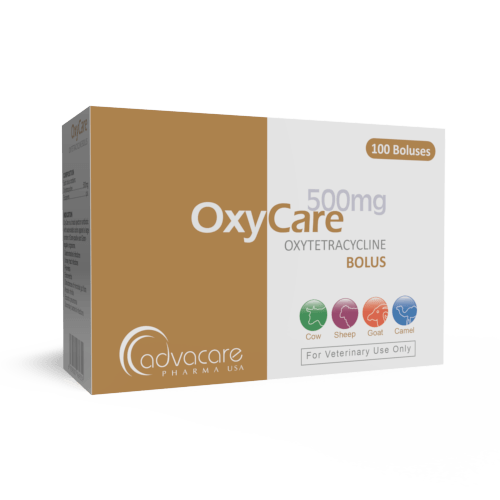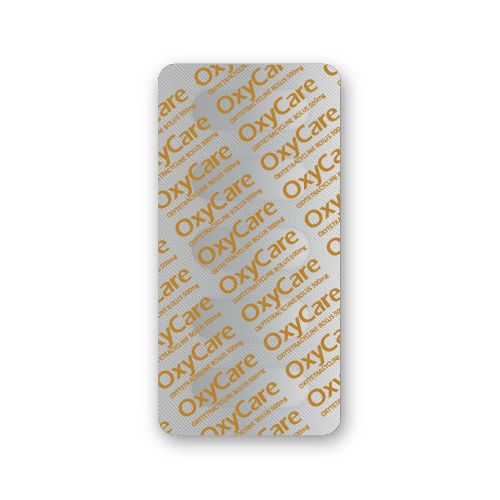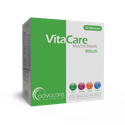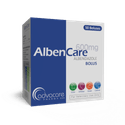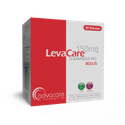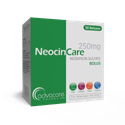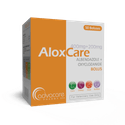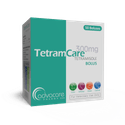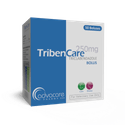- Home›
- Veterinary Pharmaceuticals›
- Veterinary Boluses›
- Oxytetracycline Boluses
Oxytetracycline Boluses
Dosage
Packaging
What is Oxytetracycline?
Active Ingredients: Oxytetracycline
Oxytetracycline Boluses are a broad-spectrum antibiotic used to treat a wide variety of bacterial diseases in cows, camels, goats, and sheep. In cattle, it is indicated for the treatment of infections such as pneumonia, shipping fever, foot rot, diphtheria, bacterial enteritis, wooden tongue, leptospirosis, and anaplasmosis. Oxytetracycline is effective against the bacteria that infect the eyes, oral cavity, bones, respiratory tract, sinuses, and blood cells in animals. This antibiotic is effective for most bacteria except for resistant gram-positive bacilli of Staphylococci.
Oral treatments of Oxytetracycline are typically used to treat larger animals like cows, camels, goats, and sheep, and even horses or pigs.
Oxytetracycline is classified in the tetracycline family of antibiotics. It is derived from the fermented product of Streptomyces rimosus. Oxytetracycline works by inhibiting protein synthesis in the bacteria. It is active against a broad range of one-celled organisms and both gram-positive and gram-negative bacteria, including Mycoplasma pneumoniae, Diplococcus pneumoniae, and Escherichia coli. It also shows action against Chlamydia, Rickettsia, and Spirochetes.
After per oral administration, this antibiotic is absorbed in the upper small intestine. After that it is distributed in the blood in a period of 2-4 hours. The absorption depends on sodium bicarbonate, aluminum hydroxide, calcium, iron, and dairy products.
The antibiotic is rapidly distributed in the whole body and enters almost all tissues and fluids. High concentrations are evident in the kidneys, liver, spleen, bone, bile, and lungs. The concentrations may vary among different tissues. Biotransformation of the drug is limited in domestic animals, and the dose is excreted unchanged. The excretion goes through glomerular filtration and the gastrointestinal tract. Excretion depends on the animal’s age, route of administration, renal health condition, urine pH, and glomerular filtration rate.
No matter the method of administration and the chosen form, this antibiotic is widely distributed in the body of the animal and sequestered, particularly in the liver, kidney, bone, and dentine. There is a minimal metabolism for tetracyclines in animals. The drug is excreted through the urine as an unchanged drug. Blood tests and urinalysis should be made before applying the antibiotic and not during the treatment period. This should be done in order to examine the animal's current health condition.
This antibiotic is also available in tablet form of Oxytetracycline HCl, as a tablet, injection, premix, and soluble powder. The chosen form depends on the veterinarian and the current health condition of the animal.
It is important to note that AdvaCare's Oxytetracycline Boluses are for veterinary purposes only.
AdvaCare is a GMP-certified producer of this product. This medication is manufactured in our factories in China, India, and the USA.
Why are we a top Oxytetracycline Bolus manufacturer?
AdvaCare Pharma is an American-owned and operated company specializing in the manufacture of veterinary medicines. As part of our range of 250+ veterinary formulations, we manufacture Oxytetracycline Boluses under strict GMP guidelines, ensuring efficacy. Our veterinary distributors have confidence in the quality of our products, making AdvaCare Pharma a leading bolus manufacturer and supplier to countries where dependable, cost-effective livestock medications are in high demand.
Uses
What is Oxytetracycline used for?
It's used to treat infections such as:
- pneumonia and shipping fever in cattle and goats
- foot rot and diphtheria in cattle and goats
- wooden tongue in cattle and goats
- leptospirosis in cattle and goats
- anaplasmosis in cattle and goats
- bacterial enteritis in cattle and goats
- salmon poisoning
- Mycoplasma infections
What animals can be treated with Oxytetracycline Bolus?
It's recommended for camels, goats, sheep and beef and dairy cattle or calves.
What are the most common diseases treated with Oxytetracycline Boluses?
The most common diseases that are treated with Oxytetracycline depend on the animal species. In cattle, it is mostly used for treating Pasteurella multocida, Mannheimia haemolytica, and Histophilus somni. In pigs, it is used for treating Mycoplasma infections, pneumonic pasteurellosis, and atrophic rhinitis. In companion animals, it is mostly used for treating Rickettsia spp. And Ehrlichia spp. Infections. In horses, it is used for treating equine piroplasmosis caused by Theileria equi, Potomac fever caused by Neorickettsia risticii, and many respiratory and soft tissue infections.
How does Oxytetracycline help in wooden tongue in cattle and goats?
The cause of this disease is Actinobacillus lignieresii. The treatment process consists of adding sodium iodide intravenously and treatment with tetracyclines. After a 5-day treatment, an improvement is visible.
How does Oxytetracycline help in salmon poisoning?
Animals that eat raw food have an increased risk of developing salmon poisoning due to uncooked salmon. The disease is caused by the parasite Nanophyetus salmincola. The clinical signs include vomiting, fever, lack of appetite, weakness, diarrhea, swollen lymph nodes, and dehydration. A combination of this antibiotic and supplementation can improve the health status of the affected animal.
How does Oxytetracycline help in Mycoplasma infections?
Mycoplasma infections are very common for dogs with low immune systems and dogs in kennels. Mycoplasmas are caused by gram-negative bacteria without a cell wall and can proliferate in large numbers causing gastrointestinal, respiratory, and reproductive issues. In companion animals, the most common infection is kennel cough, which causes serious respiratory issues. This increases the risk of secondary infections.
Mycoplasma bacteria do not respond to beta-lam antibiotics because these antibiotics destroy the cell wall, and this bacteria does not have a wall. The best treatment drug is oxytetracycline, which needs to be taken for up to 2 weeks. Other forms of Oxytetracyclines should be used for dogs. Cattle with Mycoplasma infections can be cured with Oxytetracycline boluses and other forms of the drug.
How should Oxytetracycline Boluses be stored?
They should be stored in a dark, dry location below 25°C. Keep the boluses in the blister packs until usage.
Is there a withdrawal period after treatment with Oxytetracycline?
There is not a withdrawal period for meat. The withdrawal period can depend on the dosage and the animal treated.
Dosage
How much Oxytetracycline should be given to a cattle or calves?
The usual dose is a 250-500mg Oxytetracycline per 45kg of body weight, given every 12 hours.
Refer to a veterinary doctor or pharmacist for guidelines on dosage.
Side Effects
As with all pharmaceuticals, some unwanted effects can occur from the use of Oxytetracycline Boluses.
When given at the recommended dosage, side effects are not common. Some side effects that have been recorded include but are not limited to:
- swelling of eyelids, muzzle, ears, anus, and vulva
- restlessness
- trembling
- frothing at the mouth
- gastrointestinal effects (upset stomach, nausea, diarrhea)
- sensitivity to sunlight
- rash
- allergic reaction
High oral doses may cause microflora depression or ruminoreticular stasis in ruminants.
Superinfections via fungi, yeast, and resistant bacteria might occur while taking tetracycline antibiotics in animals.
Critically ill animals can experience gastrointestinal disturbances after oral consumption.
Neuromuscular blocking effects can occur if the antibiotic is taken in higher dosages than the recommended. Animals with botulism should not be cured with tetracyclines. These animals already have neuromuscular blockage, and giving them tetracyclines can worsen their health condition.
Oxytetracycline chelates calcium in teeth and bones and can cause yellow or brown discoloration. Very high and frequent dosages can fracture the animal’s teeth.
Patients with liver issues should be examined before giving them oxytetracycline. Hepatotoxic effects can occur in pregnant animals, and the mortality rate is high.
Animals with renal insufficiency can experience nephrotoxic effects.
For a comprehensive list of all possible side effects of this medication, consult a veterinarian.
Precautions
Do NOT use Oxytetracycline Bolus for an animal that:
- has a known allergy or hypersensitivity to any of the ingredients.
- has had a hypersensitivity reaction to other tetracyclines.
This drug may cause false readings of urine catecholamines. It may also cause a false-positive urine glucose result when using Benedict's reagent.
This drug is excreted through feces, and it might not be a good choice for patients with chronic gastrointestinal issues.
Oxytetracyclines should not be given to pregnant and lactating animals. The drug is eliminated through milk, and the traces of the drug are present up to 48 hours later.
A veterinarian should examine patients with chronic kidney illness before prescribing oxytetracyclines. The biotransformation and excretion are in the kidneys, and these patients have low glomerular filtration.
The effect and absorption of tetracyclines can decrease if combined with dairy products. This antibiotic can lose activity if diluted in fluids and exposed to ultraviolet light.
What are the most common animals Oxytetracycline Boluses are used for?
Oxytetracycline boluses are primarily used for treating bacterial infections in animals and livestock. The specific common uses of oxytetracycline boluses include treatment of the following diseases:
- Pasteurella multocida
- Mannheimia haemolytica
- Histophilus somni
- Mycoplasma infections
- Pneumonic pasteurellosis
- Atrophic rhinitis
- Equine piroplasmosis
- Potomac fever (horses)
- Respiratory infections
- Soft tissue infections
- Chronic Respiratory Disease (CRD)
Cattle Bacterial Infections
Oxytetracycline is used for treating bacterial infections in cattle. It is useful against urinary tract infections, gastrointestinal infections, and respiratory infections.
The antibiotic choice and form of antibiotic depends on the diagnosis from the veterinarian. Oxytetracycline in other forms can be used for treating various infections in dogs, cats, and poultry. Rickettsia spp., Mycoplasma gallisepticum, Infectious Coryza, Ehrlichia spp., and Fowl Cholera can be cured with Oxytetracycline in other animals (dogs and poultry).
The veterinarian decides about the prescription of this drug in animals based on the current health condition. In some cases, a combination of other antibiotics and supplements is needed for complete treatment.

You might be interested in...
Why AdvaCare Pharma?
As an industry leader, we are aware of our responsibility to provide affordable and sustainable solutions to improve healthcare worldwide.
